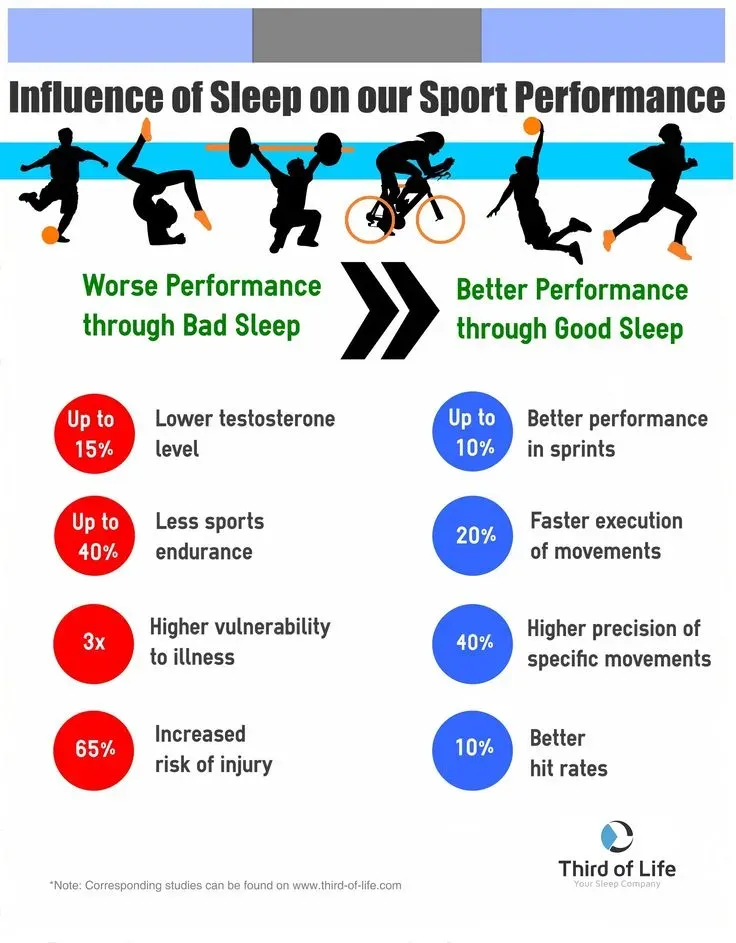Sleep and sports performance are inseparable partners, shaping daily training outcomes, strategic decision-making under pressure, and the edge athletes need when competition arrives. Understanding sleep quality for athletes reveals how rest supports rapid reaction times, precise skill execution, faster perceptual processing, injury resilience, and the consolidation of new techniques during nightly recovery. Napping for athletic performance can act as a practical bridge on days with heavy training or travel disruptions, delivering a quick boost in alertness, mood stabilization, and cognitive function without deranging the following night’s sleep. When nights are short, the effects of sleep deprivation on sports performance become evident in slower sprint times, reduced focus, impaired decision-making, slower recovery markers, and diminished readiness for the next session. Framing sleep as a core training variable encourages coaches and athletes to coordinate schedules, recovery strategies, education, and environment optimization so rest supports performance as reliably as reps, nutrition, and conditioning work.
Viewed through an LSI-informed lens, the relationship between rest and performance can be described as restorative sleep shaping circadian rhythm, hormonal balance, and the capacity for high-intensity efforts. Alternative terms such as sleep and athletic performance, daytime recovery, quality rest for competitors, and circadian alignment help coaches communicate the concept across sports while preserving the core idea. For teams, implementing a recovery sleep for athletes strategy means integrating consistent bedtimes, predictable nap windows, and travel plans that minimize sleep debt. Monitoring outcomes, adjusting workloads, and using sleep analytics can reveal how the effects of sleep deprivation on sports performance vary among individuals and disciplines. In this way, the conversation around sleep becomes part of evidence-based training design rather than an afterthought.
Sleep and sports performance: Building the foundation for peak athletic output
Sleep and sports performance are not separate domains but co-dependent forces that shape daily readiness and competitive outcomes. When sleep and athletic performance are aligned, athletes wake with clearer focus, faster reaction times, and greater consistency under pressure. This synergy enhances how the brain processes information, how the body manages energy systems, and how training adaptations consolidate during recovery.
Conversely, poor sleep can blunt cognitive function, slow decision-making, and leave athletes prone to errors in high-stakes moments. By prioritizing sleep quality for athletes, teams can maintain training intensity, reduce fatigue accumulation, and lower injury risk over the season.
Understanding sleep architecture and circadian timing to maximize training gains
Sleep is not a single state but a cycle of stages: light sleep, deep sleep (slow-wave sleep), and REM sleep. Each phase contributes differently to physical recovery and skill learning, with deep sleep supporting growth hormone release and muscle repair, and REM sleep aiding memory consolidation and motor learning.
For athletes, the balance of these stages across a full night influences how quickly new skills are retained and how effectively technique is refined in competition. Aligning training with circadian timing—consistent bed and wake times—helps optimize both sleep duration and sleep quality for athletes.
Optimal sleep duration and timing for athletes: 7–9 hours and consistent schedules
Most athletes perform best with about 7–9 hours of sleep per night, though individual needs vary with training load, travel, and chronotype. Prioritizing this range supports cognitive sharpness, reaction speed, and physical recovery.
In addition to total hours, consistent timing matters. Regular bed and wake times, even on rest days, reinforce circadian alignment and improve sleep quality for athletes, leading to more reliable performance across sessions.
Effects of sleep deprivation on sports performance: from margins to major declines
The effects of sleep deprivation on sports performance are well-documented across sports. Even a single night of restricted sleep can impair sprint speed, aerobic capacity, and decision-making in fast-paced games. Small decrements in accuracy or reaction time can swing outcomes in close contests.
Chronic sleep insufficiency compounds these issues, elevating injury risk, prolonging recovery, and reducing motivation. Endurance metrics, heart-rate variability, and perceived exertion can all deteriorate when sleep fails to meet the body’s recovery needs.
Recovery sleep for athletes: fueling growth, repair, and adaptation
Recovery sleep for athletes is a strategic asset that supports growth hormone release, protein synthesis, and tissue repair after hard training. A well-timed night of sleep amplifies the benefits of effort, helping soreness settle and joints stay mobile.
Coupled with smart training loads, recovery sleep for athletes enables consistent performance gains, better mood, and improved learning of new skills as the nervous system consolidates motor programs during rest.
Napping and daily routines: napping for athletic performance
Naps can be a powerful tool when training loads are high, competition schedules are tight, or travel disrupts nocturnal sleep. Short naps of 20–30 minutes can boost alertness, mood, and short-term cognitive function.
For some athletes, longer naps (60–90 minutes) may be beneficial on heavy training days or after late travel, but timing is key to avoid interfering with nighttime sleep. When planned thoughtfully, napping for athletic performance complements nighttime recovery and reinforces overall sleep quality for athletes.
Frequently Asked Questions
How does sleep quality for athletes influence sleep and sports performance?
Sleep quality for athletes directly influences sleep and sports performance by sharpening reaction times, decision-making under pressure, and skill retention. Deep sleep supports physical restoration and growth hormone release, while REM sleep aids memory consolidation and motor learning. For optimal results, aim for about 7–9 hours per night with consistent bed and wake times to maximize sleep quality for athletes.
What are the effects of sleep deprivation on sports performance?
Sleep deprivation can impair sprint speed, endurance, and accuracy, as well as cognitive flexibility and decision-making during competition. Chronic sleep insufficiency raises injury risk and slows recovery after workouts, and can worsen mood and motivation. Even heart rate variability can show greater physiological stress when sleep is limited.
Why is recovery sleep for athletes essential for performance and training adaptations?
Recovery sleep for athletes is a strategic asset because growth hormone release and tissue repair peak during sleep, supporting training adaptations and reduced soreness. Well-timed recovery sleep helps preserve joint mobility and enables better learning and technique retention. Align training loads with recovery needs and use good sleep to amplify workout benefits.
How can napping for athletic performance benefit training and competition?
Napping for athletic performance can boost alertness, mood, and short-term cognitive function. A 20–30 minute nap can improve wakefulness without morning sleep inertia; longer naps (60–90 minutes) may help on heavy training days or after late travel, but timing matters to avoid disturbing nighttime sleep.
What practical steps improve sleep quality for athletes to support sleep and athletic performance?
Practical steps include a consistent sleep schedule, optimizing the sleep environment (cool, dark, quiet), limiting late caffeine, establishing a calming pre-sleep routine, maximizing morning light exposure, and scheduling training to support sleep onset. Also manage meals and hydration and consider travel strategies like progressive time-zone adjustments and, if needed, strategic napping to maintain performance.
How should travelers manage sleep and athletic performance when crossing time zones?
To protect sleep and athletic performance during travel, gradually shift your sleep window before crossing time zones, use bright light strategically, and plan strategic naps to maintain a stable circadian rhythm. Track sleep, share data with coaches, and be flexible with training loads to prioritize recovery sleep for athletes during travel.
| Topic | Key Points | Impact on Performance |
|---|---|---|
| Sleep Architecture | Sleep cycles include light sleep, deep sleep (slow‑wave), and REM. Deep sleep supports physical restoration and growth hormone release; REM supports memory consolidation and motor learning. Each stage contributes to recovery and learning. | A balanced mix of sleep stages enhances recovery, skill retention, and learning, boosting readiness for training and competition. |
| Sleep Duration & Timing | Most adults need about 7–9 hours; keep consistent bed and wake times. Irregular schedules disrupt circadian rhythm and can degrade performance later in the day. Sleep quality (ease of falling asleep, awakenings) matters as much as total hours. | Consistency in duration and timing improves wakefulness, mood, and training readiness. |
| Cognition & Perception | Sleep loss impairs reaction time, decision speed, and vigilance. In fast sports milliseconds matter, so sleep deprivation can slow decisions and motor responses. | On-field decisions and speed of response deteriorate with poor sleep. |
| Motor Learning & Skill Retention | Sleep after practice facilitates skill acquisition and consolidation; sleeping after training improves retention and execution. | Faster learning curves and more reliable performance in games. |
| Physical Performance | Fatigue from inadequate sleep can reduce strength, power, and endurance. Recovery sleep supports glycogen replenishment, hormonal balance, and inflammation control. | Better high‑intensity performance and quicker recovery between efforts. |
| Recovery Sleep | Growth hormone peaks during sleep; sleep aids tissue repair, protein synthesis, and adaptation to training. Good sleep reduces soreness and preserves mobility; supports mood and motivation. | Enhanced training adaptation, reduced injury risk, and improved adherence. |
| Effects of Sleep Deprivation | Short-term sleep loss can impair sprint speed, aerobic capacity, and accuracy; chronic deprivation raises injury risk and slows recovery; HRV may worsen. | General performance declines, higher risk of injury, and longer recovery times. |
| Strategies to Improve Sleep Quality | Establish a consistent schedule; optimize the sleep environment; limit late caffeine; pre‑sleep routine; manage light exposure; schedule training timing; align hydration and meals; plan travel to minimize disruption. | Practical, actionable steps lead to better sleep and fresher, more reliable performance. |
| Napping for Athletic Performance | Short naps (20–30 minutes) boost alertness and cognitive function; longer naps (60–90 minutes) can help on heavy training days but may affect night sleep if timed poorly. | Napping can aid recovery and performance if timed appropriately earlier in the day. |
| Monitoring & Individual Variation | Sleep tracking with wearables/apps helps tailor strategies; consider chronotype, caffeine sensitivity, and stress. Test and adjust plans to individual responses. | Personalized plans improve consistency and outcomes. |
| Sleep, Nutrition, and In‑Game Demands | Protein around sleep aids repair; evening carbohydrates influence sleep onset and melatonin; timing around training matters for energy restoration and sleep continuity. | Nutrition-sleep synergy supports better recovery and performance. |
| Putting It All Together: A Practical Plan | Baseline assessment followed by incremental changes over weeks: fixed sleep window, environment optimization, reduced screen time, planned naps, wake-time consistency, and periodic reviews. | A structured, progressive plan translates sleep strategies into sustained performance gains. |



